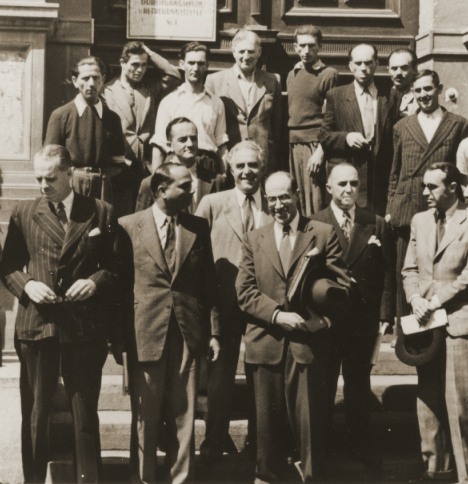Pages in Section 12

UNSCOP until Exodus 47
ii.British Alienate UNSCOP
iii. The Two Sergeants
iv. End of the PMF
v. Life at Bassa Tegart 1947
vi. UNSCOP's Partition Plan and UN vote.
vii. Police Reactions to UN Vote
 The United Nations Special Committee on Palestine (UNSCOP) comprised representatives from 11 member states,
The United Nations Special Committee on Palestine (UNSCOP) comprised representatives from 11 member states,
Australia, Uruguay , Iran, Guatemala, India, Holland, Yugoslavia, Peru, Czechoslovakia, Canada and Sweden.
Sweden from June onwards, provided the chairman, lawyer Alfred Emil Fredrik Sandström.
UNSCOP held its first meeting in New York on 26 thMay 1947.
On 15 th June, UNSCOP arrived in Palestine to conduct investigation and held its first working session the next day. Members toured Palestine's villages, towns, agricultural settlements, schools, colleges, hospitals, factories and quarries.
The CID watched official Jewish bodies, and in particular those of the Mapai leadership, as they made preparations for UNSCOP's visit.
Jewish Stance on UNSCOP
The Jewish Agency Executive recognized the importance of the visit and convened in Jerusalem on 18th June to discuss how they should present the Zionist demands to UNSCOP. They decided that, while their public position would be to demand all the territory to the west of the Jordan River, members of the Executive would take action in support of a compromise solution of 'a viable Jewish state'. They also agreed to sabotage Irgun and Lehi anti-British operations while UNSCOP were conducting their enquiry.
They engaged in extensive spying to learn what the committee members were thinking, and appointed Walter Eytan of the Jewish Agency with the task of ensuring that UNSCOP members would constantly encounter positive people and experiences — for example, Jews from their home countries and projects that had been spectacularly successful. Eyton passed on the information to Abba Eban, David Horowitz, and Moshe Tov, the three men the Jewish Agency had chosen to liaise with UNSCOP.
British Stance on UNSCOP A for rab Stance on UNSCOPThe Arab Higher Committee (AHC), the effective 'government' of the Palestinian Arabs, declared that the United Nations should simply have called for the establishment of an Arab state in all of Palestine rather than conducting an inquiry. It announced that it would have nothing to do with UNSCOP. The AHC, by threats and blackmail, forced the entire Palestinian Arab public to boycott the committee.
The British made no recommendations of its own, but provided a supplement to information they had already presented to the 1946 Anglo-American Enquiry. Throughout they endeavoured to maintain correct relations with UNSCOP but their position was not helped by the decision to continue placing illegal immigrants in detention camps, by the state of Jerusalem, all barbed wire and police patrol cars
The Result
UNSCOP admired the Jewish spirit and organisation and concluded they were sufficiently developed to become an independent state.
UNSCOP considered the Arabs' progress economically and agriculturally insufficient for self-rule.